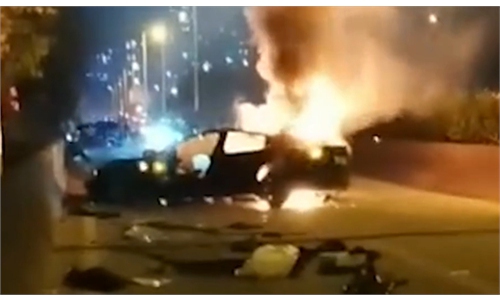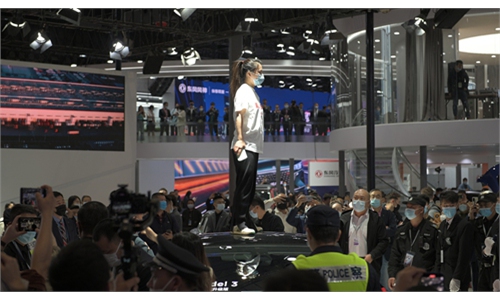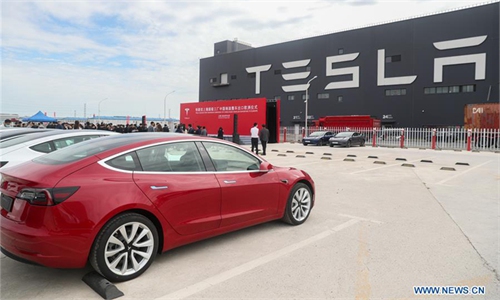Tesla besieged following auto show protest
Dispute with irate car owners comes to a head on social media
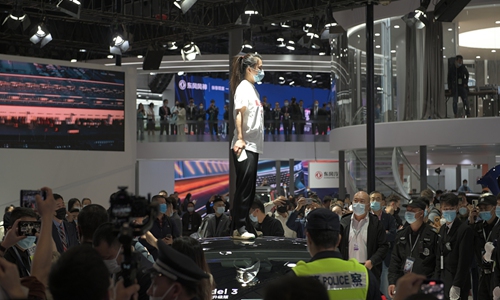
A protester standing on a Tesla Model 3 on 2021 Shanghai Auto Show. Photo: CFP
While Tesla's vice president successfully dodged a public appearance at the Boao Forum for Asia, the company can't dodge powerful shockwaves after the dramatic protest staged at the Shanghai auto show, which included a government order for it to hand in vehicle data, a harsh-toned statement from Chinese discipline regulators criticizing its "arrogance," as well as thousands of posts on China's web platforms mixing criticism and support.
The US electric vehicle (EV) star is paying a price for not respecting Chinese customers despite spiraling sales data, experts said, adding that although this does not mean a Waterloo battle for Tesla, it does raise questions on the brand's long-term success in China.
Tesla seems to be in a tense atmosphere now. It tightened security around its booth in the auto show, including installing a rail around its booth and assigning about 10 black-suited guards at different areas of the booth. The company also sent one salesperson to accompany every visitor during their stay at the booth.
At a Tesla dealership in Beijing's China Central Place, the Global Times saw no customers at about 13:30 pm.
Tesla on Tuesday night also issued a new statement on China's Twitter-like Sina Weibo, the third such statement after video of a woman surnamed Zhang from Central China's Henan Province on Monday morning climbed a Model 3 at the Shanghai Auto Show 2021 to protest Tesla's brake malfunctions went viral on China's web platforms.
The woman is in police custody. Another car owner, a pregnant woman from Xi'an, Northwest China's Shaanxi Province who went to protest along with the aforementioned woman, was given an administrative warning for disrupting public order.
In its latest statement, Tesla apologized for not being able to solve the complaints the car owners lodged. The company also said it had established a special group to cope with the incident, and would "try its best to fulfill the car owners' demands and let them feel satisfied." But the latest statement dodged mentioning whether its products had any quality problems.
The statement was a gesture from the US company that came amid fermenting public fury over its earlier response. In two public statements the company issued earlier on Monday, it said it would be responsible for its product quality to the end, but would "never give up to unreasonable claims."
The protestor from Xi'an surnamed Li told the Global Times that Tesla has not contacted her so far. She also said that she is facing many misunderstandings on the internet, with netizens accusing her of "blackmailing" Tesla. "I feel wronged," she said.
Li said she had contacted a local Tesla dealership after her car had a brake problem. But Tesla employees refused to provide any vehicle data and requested results from a third-party testing agency. Li also said that Tesla didn't designate any specific agency for her.
Li also noted that she and Zhang got to know each other in a WeChat group that contained dozens of Tesla car owners who have similar car problems, but she said she didn't know of a nationwide organization for Tesla car owners to defend their rights.
Tesla's vice president Tao Lin didn't show up at a forum at the Boao Forum which she was scheduled to attend on Wednesday.
Data handling dispute
A key conflict point between Tesla and the car owners was the handling of car data around the time of the accident. According to a representative of the Administration for Market Regulation of Zhengzhou, Zhang had demanded that Tesla provide complete car data in 30 minutes ahead of the accident, while Tesla only agreed to commission a third party to inspect the brake system.
The Zhengzhou market regulator on Wednesday ordered Tesla's Zhengzhou subsidiary to hand in relevant vehicle information "immediately," according to state broadcaster China Central Television.
Li Weimin, director of Beijing Wei Bo Law Firm, told Global Times on Wednesday that Tesla has obligations to provide related data to investigate vehicle accidents and resolve problems.
According to China's Law on the Protection of Consumer Rights and Interests, consumers have the right to know detailed information of the products they buy or use, such as price, performance, certificate and after-sales services, said Li.
"Especially for the consumers' feedback of important problems such as brake failures, Tesla has the responsibility to ensure consumers' right to know," said Li.
Such cases of conflict between Tesla and car owners, who disagree over car accident checkups, are rising along with Tesla's success in the country. Another Tesla owner also told the Global Times that there is no effective outlet to express their concerns to help solve their problems, and protesting in public "seems the only way out."
A Beijing-based white-collar worker surnamed Wang who claimed a similar problem of Model 3 running out of control said they tried multiple ways including calling a Tesla services center or finding lawyers, but all to no avail.
"Our requirement or starting point is so natural and simple - it is just for the sake of safety, but we need to come this far with no progress," he said.
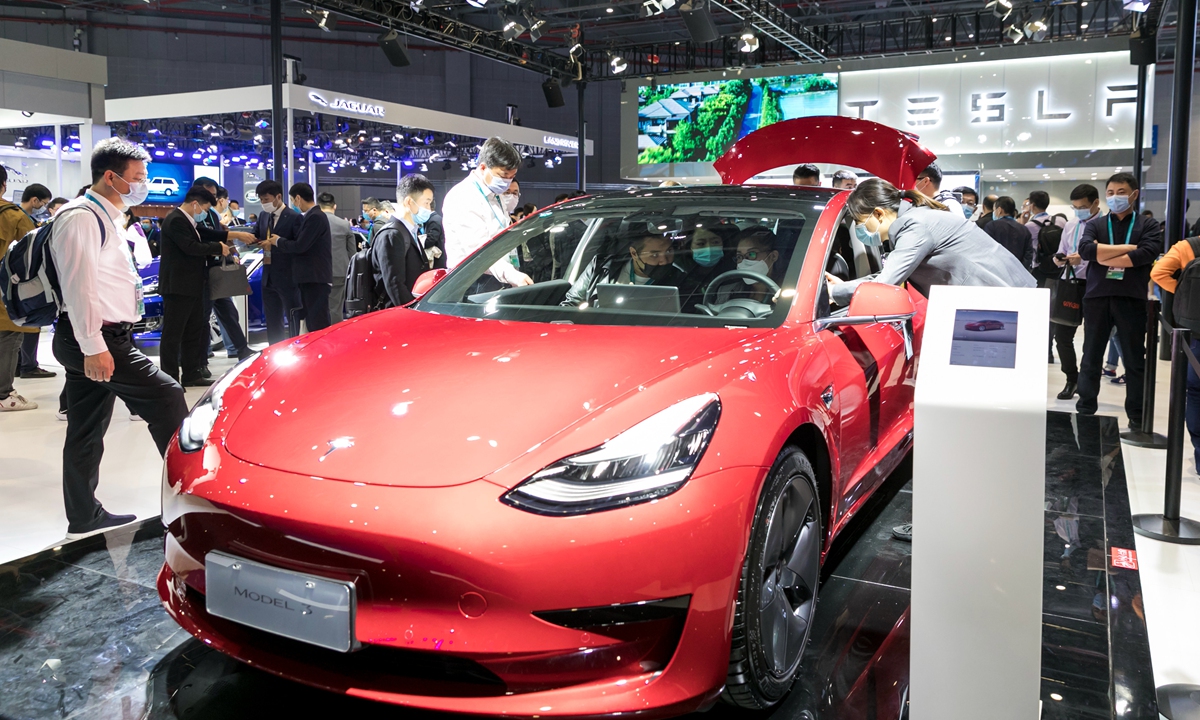
A Tesla EV model seen in Shanghai in November 2020 Photos: cnsphoto
Fire and Ice
The incident also reflected a delicate position where the US electric car maker is currently at in China. On one hand, its launch of two China-made car models had received a wide response from Chinese customers, which pushed its stock prices to new highs. But on the other hand, it is often besieged by criticism of its arrogance and inappropriate treatment of its customers.
Independent car analyst Feng Shiming, for example, criticized Tesla for inconsistency in the statements it issued after the auto show incident, which he said showed a lack of sincerity on the side of the brand toward Chinese customers.
"Where is their credibility with such changeable attitudes? And where does their confidence come from in affirming their validity now that no trustworthy third-party institutions have provided evidence the car has no quality problems?" Feng raised the questions when being interviewed by the Global Times.
Experts said that the incident's influence on Tesla's car sales would be limited, not to mention causing a short-term slide in its sales, because customers wouldn't easily give up a car brand unless its technology plunges sharply.
"However, I think Tesla's position in China is not that secure, because its technology has not entered a totally ripe period and is not necessarily irreplaceable with the rise of domestic electric car brands. This, plus its uncertain reputation, would put the company in a dangerous market position in the long run," Hu Qimu, chief researcher at the Sinosteel Economic Research Institute, told the Global Times on Wednesday.
Hu also stressed that overseas brands can't adopt a "looking-down strategy" for the Chinese market and not respecting local culture in public relations tactics.
"Chinese customers might have worshipped overseas brands in the past over a technological gap and information imbalance, but this no longer exists with China's economic rise and consumption upgrade," he said.
Many overseas companies have also encountered similar reputation crises in the Chinese market for arousing criticism of not showing respect to Chinese customers. The Shanghai Disney Resort, for example, aroused controversy in China after its bag-checking policies were criticized as not respecting local customers.
